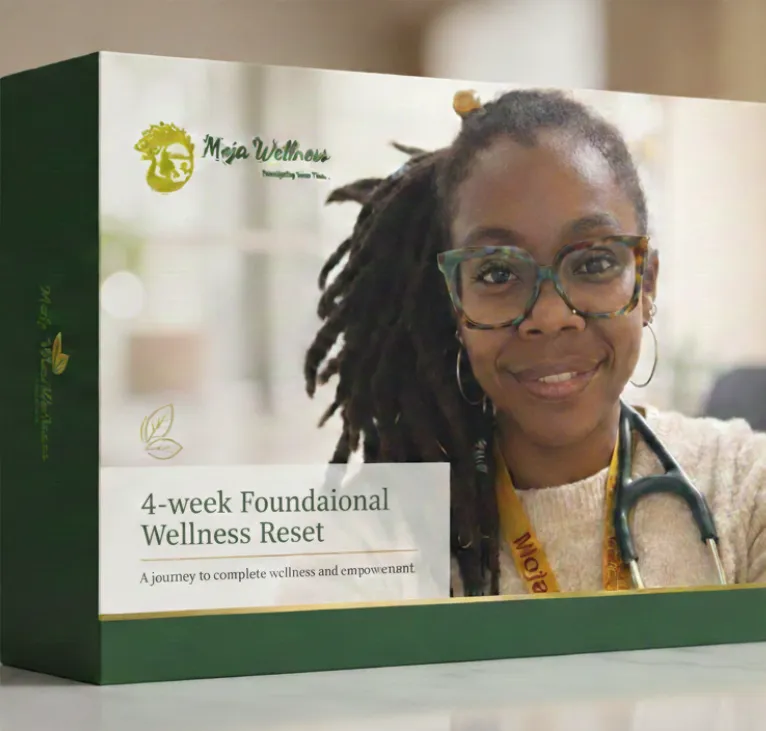
Reconnect.
Restore. Thrive.
Discover Holistic coaching, therapeutic bodywork, herbal wisdom, and premium wellness
experiences designed to nurture your mind, body, and spirit—naturally and sustainably.
🌿 Holistic Coaching
Restore balance, reduce stress, and build sustainable habits that support whole-person wellness.
💆 Bodywork & Beauty
Relieve tension, restore circulation, and enhance natural radiance through therapeutic touch and care.
🌱 Herbal Education
Support your body naturally with plant-based education and simple, empowering self-care rituals.
🌺 Signature Care
Experience high-touch, personalized wellness support designed for deep transformation.
Signature Offerings
Discover Holistic Solutions
ABOUT US
Your Trusted Partner in Holistic Wellness
At Moja Wellness, we are dedicated to empowering individuals to reconnect with their bodies, minds, and spirits through evidence-informed, holistic care. Our mission is to provide personalized wellness solutions that honor your unique journey—supporting balance, vitality, and emotional resilience through coaching, bodywork, herbal wisdom, and premium care experiences.
With a commitment to integrity, inclusivity, and lifelong learning, we strive to enhance your well-being and confidence at every stage of life. Trust in our expertise and experience a renewed sense of health, harmony, and vitality with every service we offer.


WHAT WE DO
Holistic Solutions for Every Body and Mind
At Moja Wellness, we provide curated, holistic wellness experiences designed to nurture your mind, body, and spirit. From personalized coaching and therapeutic bodywork to herbal education and signature high-touch programs, every service is tailored to support lasting balance, vitality, and emotional resilience.
Our approach blends modern evidence-informed practices with ancestral wisdom, empowering you to take charge of your well-being while enjoying a premium, personalized experience. We help you restore energy, reduce stress, and cultivate sustainable habits that enhance your overall quality of life.
ABOUT THE FOUNDER & CEO
Tanya Murray
Holistic Health & Wellness Practitioner
Tanya is a passionate holistic health and wellness practitioner. Diagnosed at age 5 with a genetic blood disorder, she has dedicated her life to bringing awareness, healing, and balance to herself and others. Over the past 15 years, her self-healing journey has guided her to become a Licensed Cosmetologist, Licensed Massage Therapist, and earn a Bachelor of Science in Alternative Medicine along with a Certification in Herbalism.
At Moja Wellness LLC, Tanya combines her extensive knowledge of mind, body, and spirit to help individuals achieve lasting health and harmony. She takes the time to understand each person’s unique needs, offering guidance and support on their personal healing journey. Tanya believes that health is true wealth, and with mindful practices, good habits, and self-awareness, everyone can attain balance—even while managing chronic conditions.

Mission
Moja Wellness exists to empower individuals to reconnect with their bodies, health, and inner resilience through holistic education, therapeutic care, and lifestyle guidance.
We integrate bodywork, herbal wisdom, beauty and self-care practices, and wellness coaching to support sustainable well-being rooted in truth, embodiment, and whole-person care in a modern world.
Vision
Moja Wellness envisions a world where healing is informed, embodied, and deeply human—never rushed, fear-based, or fragmented.
As the practice evolves, Moja Wellness aims to grow into a trusted integrative wellness ecosystem that bridges traditional wisdom and modern science while honoring the individuality, lived experience, and resilience of every person served.
TESTIMONIALS
Real Life-Changing Results

Company Name should look
for ones that are specific,
detailed, and highlight the
unique benefits of working with
the company.
Alex john martin
Manager

Company Name should look
for ones that are specific,
detailed, and highlight the
unique benefits of working with
the company.
Alex john martin
Manager

Company Name should look
for ones that are specific,
detailed, and highlight the
unique benefits of working with
the company.
Alex john martin
Manager
FREQUENTLY ASKED QUESTIONS
Your Questions Answered: Clear, Concise, and Informative
At Moja Wellness, we understand that exploring holistic wellness services can bring up questions. Our goal is to provide clarity, support, and guidance so you feel confident in your journey toward balance and vitality.
From coaching and bodywork to herbal education and premium concierge programs, we prioritize transparency, personalization, and evidence-informed practices. Below, you’ll find answers to our most common questions about what we offer, how our programs work, and how to get started.
We’re committed to helping you make informed choices, so you can experience lasting wellness that nurtures your mind, body, and spirit.

What makes Moja Wellness different from other wellness programs?
We take a whole-person approach, blending lifestyle coaching, emotional support, herbal wisdom, bodywork, and holistic beauty practices. Our focus is on education, empowerment, and sustainable wellness, helping you understand the “why” behind your health so you can create lasting balance.
Who can benefit from Moja Wellness services?
Anyone seeking mind-body alignment, emotional resilience, and lifestyle support can benefit. Our clients are often adults 30+, predominantly women, including women of color, who want culturally resonant, holistic care that honors their individuality while supporting long-term health, beauty, and vitality.
Are Moja Wellness services a replacement for medical care?
No. Our services are non-medical and designed to complement—not replace—medical care. We provide lifestyle guidance, stress management, energy support, emotional resilience, and education to enhance well-being alongside conventional healthcare.
How do online coaching sessions work?
All virtual sessions are conducted via video calls and are personalized to your unique needs. Sessions may focus on lifestyle change, chronic condition support, stress reduction, emotional resilience, or holistic beauty routines. Packages and follow-ups provide ongoing guidance, accountability, and education.
How does Moja Wellness support long-term wellness?
We emphasize education, lifestyle integration, and personalized guidance, helping you build sustainable habits and routines that improve physical, emotional, and energetic health. Our approach blends modern science with holistic wisdom, ensuring wellness is lasting—not temporary.
About Us
Science Meets Skincare: Unveil Your Best Skin
Copyright© ((right_now.year}} Moja Wellness - All Rights Reserved.



















Facebook
Instagram
Youtube